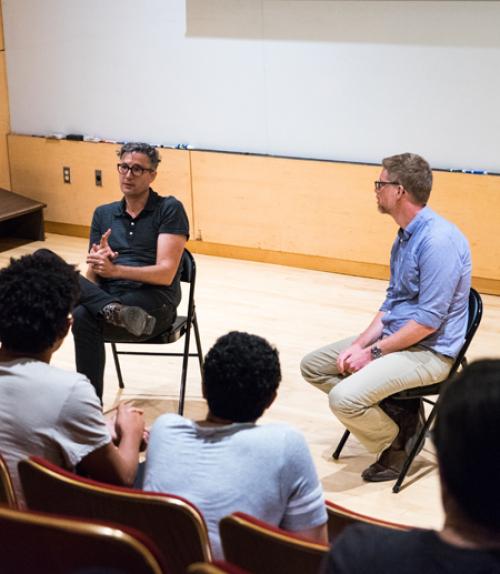Screenwriter Chase Palmer met with students Sept. 21 as part of the Professional Directions Series hosted by Austin Bunn, associate professor in the the Department of Performing and Media Arts (PMA) and talked about the importance of networking and taking the time to write.
Palmer, who has had two works on the Black List (an annual industry survey of the “most liked” unproduced screenplays), wrote the screenplay for “It” (2017), adapted from the 1986 novel by Stephen King.
At the Schwartz Center, Palmer spoke about pursuing a career in film and taking the “baby steps” he needed to get where he is today.
As an environmental science major in college, he graduated with very little film experience, other than his thesis film. So he knew it was crucial for him to figure out who was who in film and immerse himself in the community.
So post-graduation, he spent some time gaining some experience in the industry – interning at the Independent Filmmaker Project (IFP), working as a production assistant for indie films and completing temp jobs. Working on a set helped him meet people and learn more about how movies are made.
But “there is no defined way to become a writer or director,” he said. He often saw those who wanted to write or direct getting stuck on the production side.
Palmer said another crucial step in developing his career was taking the time to write. After working for a while in film, he decided to work for his father (a hotel builder and Cornell alum), on his construction site. Not only did this give him the opportunity to manage people with different skillsets and deal with the creative components of the trade (from working with contractors to architects), it also gave him the time he needed to sit down and write.
After finishing his construction day job between 3-4 p.m., he’d take the rest of the day to practice writing.
His early scripts, he said, weren’t very good. “But the important thing was finishing them.” Along with persistence in writing, Palmer said it was important for him to gain experience on sets, figure out how to shoot and save enough money to produce a film.
After a while, he found success with “Neo-Noir,” which was shown at the Sundance Film Festival and helped him to meet other filmmakers and learn about their experiences. “A big part of starting out in this business is learning – learning who does what, what companies there are and what they’re looking for.” The script also won awards at other festivals, which helped his writing and directing gain attention.
Those connections and awards eventually led Palmer to find an agent. “It took time and what was important about that time was building a relationship with the community – with filmmakers, with agents. They’re the heart of it.” Filmmakers and screenwriters might need to fly to Los Angeles or New York on their own dime to attend film festivals, he said. “You need to be part of the community.”
For the second half of the session, Palmer discussed his experience writing “It” (2017).
Although “It” is by nature a horror film, he emphasized that at the center of the film was the story of the children.
“It’s really about the children… The scary stuff comes later in the filming,” he said.
Of all the characters in the film, Bev was his favorite because of her strength. “She had the most garbage to deal with in her personal life, and she did it with such grace,” he said. “She was always kind to the other boys.” Plus, he said, “She was so well cast. It was a pretty difficult character to pull off.”
Palmer also talked about the different changes the script went through. Sexuality, for example, was a theme that was altered because of the studio’s concerns. In the end, the script was a hybrid work with the studio’s input.
To date, “It” has grossed over $500 million worldwide, with over $290 million in the U.S. and Canada. The film has also set the record as the highest grossing horror film of all time.




